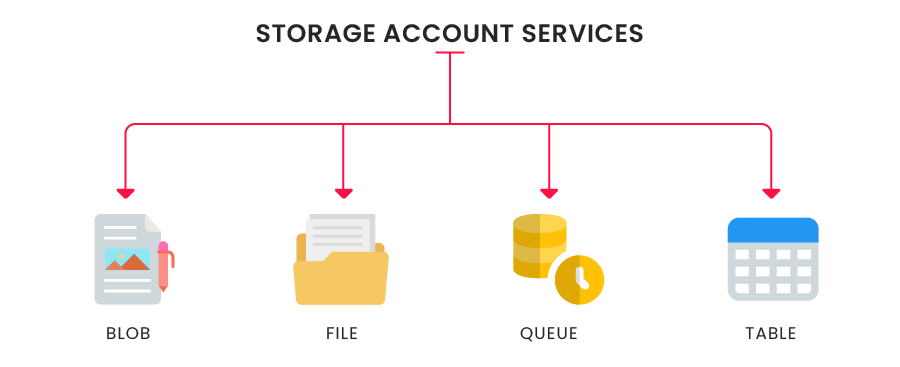An Overview of the Azure Storage
Selecting the right storage solution is a crucial part of any project. Storage accounts are one of the most robust storage solutions in Azure. It is managed by Microsoft and provides an enormous file system service for the cloud, a messaging store for reliable messaging, a scalable object store for data objects, and a NoSQL store. It is durable because Microsoft manages all the hardware failures, along with being secure because the entire data is encrypted. It is also scalable because it can handle data of sizes up to petabytes and is accessible because there’s a bunch of APIs and SDKs, allowing you to connect to Azure Storage.

Azure Storage Account Services

- 1. Blob Storage: Azure Blob storage is a highly scalable service that is used for text and binary data. It is decapsulated into containers, and each container includes several files. It is perfect for:
- Documents and Image serving directly to a browser
- Distributed access storage of files
- Audio and Video streaming
- Data storage for backup and restore, disaster recovery, and archiving
- Data storage for analysis by an on-premises or Azure-hosted service
- 2. File Storage: This service manages file shares for cloud or on-premises deployments. It is decapsulated into shares, and each share comprises files and folders. It is for situations where you need file shares and where you will use the ‘Lift and Shift’ scenario.
- 3. Queue Storage: This is a middleware service because it delivers cross-service communication from messaging and events. It is decapsulated into queues, and each queue incorporates multiple messages. It is a messaging store for well-founded messaging between components of an application.
- 4. Table Storage: This is the most simple and basic NoSQL database in a Cloud, but it is also highly scalable like other services. It is decapsulated into tables, and each table incorporates rows of data. It is a NoSQL store for schema-less storage of structured data.
Types of Azure Storage Accounts
There are various types of Storage Accounts provided by Azure. Each type has its own features and varied pricing model. The kinds of Storage Accounts are mentioned below:
- 5. General-purpose v2 Accounts: This is a primary storage account that carries the updated Azure Storage characteristics and consolidates the entire functionality of general-purpose v1 and Blob storage accounts. It is recommended for scenarios using Azure Storage because it provides the lowest per-gigabyte capacity prices. These accounts offer multiple access tiers for storing data based on your usage patterns. It supports Blobs, Data Lake Gen2, Files, Disks, Queues, and Tables.
- 6. General-purpose v1 Accounts: This is a legacy account type that grants admittance to all Azure Storage services but does not have the latest features or the lowest per-gigabyte capacity prices. It is recommended to use general-purpose v1 accounts when your applications demand the Azure classic deployment model or transaction-intensive applications. You can use significant geo-replication bandwidth but don’t need a large capacity, or you use an earlier version of the Storage Services REST API that was used before 2014-02-14 or a client library with a version lower than 4.x. These storage accounts support Blobs, Files, Disks, Queues, and Tables.
- 7. Block Blob Storage Accounts: This is a specialized storage account in the premium performance tier for stockpiling unstructured object data as block blobs or append blobs and provide low, consistent latency and higher transaction rates. It is recommended for scenarios with high transaction rates or scenarios that use smaller objects or require consistently low storage latency. These storage accounts do not support tiering to hot, cool, or archive access tiers, page blobs, tables, or queues.
- 8. File Storage Accounts: This is a specialized files-only storage account with premium performance characteristics used to store and create premium file shares. It is recommended for enterprise or high-performance scale applications as it offers unique performance dedicated characteristics such as IOPS bursting. These storage accounts support files but do not block blobs, append blobs, page blobs, tables, or queues.
- 9. Blob storage Accounts: This is a legacy Blob-only storage account that is an object storage solution for the cloud. It is enhanced for storing extensive amounts of unstructured data. Data that doesn’t cohere to a particular data model or definition, such as text or binary data, is referred to as unstructured data.
Data Redundancy in Azure Storage
There are multiple copies of your data replicated in Azure storage. The options include:
- Locally-redundant storage (LRS)
- Zone-redundant storage (ZRS)
- Geo-redundant storage (GRS)
- Read-access geo-redundant storage (RA-GRS)
Microsoft Azure with Infosec Train
You can opt for any Microsoft Azure course from our variety of courses at Infosec Train for professional knowledge and an in-depth understanding of Azure Storage. We are among the leading training providers and have well-read and experienced trainers. The courses will provide you an improved version of the basic concepts and sound knowledge of the subject.
Check out the latest schedule of our Microsoft Azure Courses:
AZ-500 certification training course
AZ-304 certification training course
AZ-104 certification training course









 1800-843-7890 (India)
1800-843-7890 (India)